Brass Eye, and the Limits of Satire
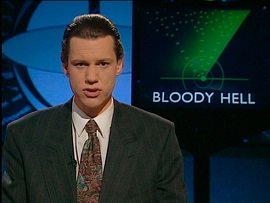
The first twenty-four hour news channel was CNN, founded in 1980. Over time the idea took hold and spread across the world, leading to the birth of the “twenty-four hour news cycle” – the endless need to constantly draw attention to endless “news”, no matter how trivial or baseless. In 1991 Armando Ianucci [1] set out to skewer this churning obsession with a surreal take on the news programe called On The Hour, a thirty minute radio show that was his first real hit. Nowadays it’s best remembered as the show that created Alan Partridge, Steve Coogan’s comedy alter ego, but it also led to fame for its lead actor and writer (playing the anchor of the show), a former radio DJ named Chris Morris. As was common with successful BBC radio comedy shows at the time, it moved to television as The Day Today. The show only ran for one season (not unusual for a comedy series like this in the 90s), but it made its stars, up and coming young comedians like Stuart Lee and Richard Herring, recognisable to the public. Morris’ deadpan stylings won him Best Newcomer at the British Comedy Awards. The same year he collaborated with the legendary British comedian Peter Cook on a series of improvisational interviews titled Why Bother. [2] It was recognition by British comic royalty that Morris had arrived.
In 1997 Chris Morris released Brass Eye, a show that at first glance looked very similar to The Day Today. Still fronted by Morris in very much in the same persona, the format this time was that of a current affairs rather than a news show. There were other changes. Morris had Channel 4, the British channel that was at the time best known for “youth” programmes, late night film marathons and generally aligning itself with the counter-culture. It was a sign that this time Morris was intending to get a bit darker.
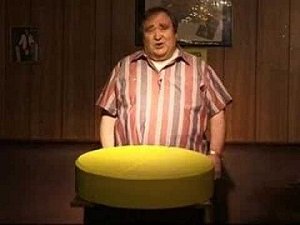
That was immediately confirmed in the first episode, Animals, which opened with Morris disrupting a dinner party and then walking off through a corridor made of halved pig carcasses. The episode continued in an uncompromising tone, with jokes based on bestiality and cruelty to animals. But the most notable feature was unwitting celebrities (who thought they were featured on a genuine program) being drawn into ridiculous conversations with Morris about spherical cows and whether wasps actually sting people. This turned into a central feature in the second episode, Drugs. Morris convinced several well known figures, including Noel Edmonds, Bernard Ingham, Bernard Manning and Rolf Harris to denounce the evils of “cake”, while holding up a comically oversized pill and repeating lines like “Cake is a made up drug – it’s not made from plants, it’s made from chemicals by sick bastards”. He even persuaded the MP David Amess (who described it on screen as “a made-up psychoactive chemical”) to ask a question in Parliament about the drug. [3] (To their credit, the Government response was that they had no reports of anyone using the drug in the UK.) The controversial subject matter and high profile victims put the show in headlines, and viewership surged. The show had a heady blend of black humour and extreme silliness that captured the public imagination. There was additional controversy, of course, especially with a reference to notorious serial killer Myra Hindley in the Crime episode. After six episodes the series ended, several celebrities fired their agents, and Will Self wrote a column declaring that Chris Morris was God. Morris went on to do his own twisted take on the sketch shows that were endemic on TV at the time with Jam, a bizarre and surreal show that remains both deeply funny and deeply disturbing. But then in 2001, four years after it left the air, Brass Eye returned for an unforgettable one-off special.
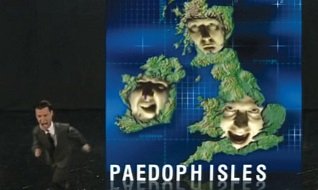
At the time Britain was in the grip of a tabloid maelstrom (not dissimilar to the current whipped up scare over immigration). The target of the frenzy, and the subject of the Brass Eye special? Paedophilia. Papers were “naming and shaming” people who had served sentences for sexual offences against children. Of course, sometimes they named the wrong people, but why let that get in the way of a good old witch hunt? The highlight of this paranoia was an incident in 2000 when vandals misinterpreted the job title of a paedatrician and vandalised her home. (Yes, really.) There were some genuinely horrifying cases, and some good journalism around them. But there were also people who saw this as an opportunity for some good old fashioned homophobia, with many deliberately conflating homosexuality and paedophilia. Throw in the sanctimony of those desperate to cast themselves in a modern morality play, and you had a mix that Morris, clearly, couldn’t resist.
The show, Paedogeddon (which went out at the incredibly late hour of 12.10am) wasn’t really that different from any other episode of the original series. Celebrities were hoodwinked into saying ridiculous things, endorsing a charity named “Nonce Sense”. [4] People were warned of a paedophile “disguised as a school”. At one stage the show was “invaded” by a pro-paedophile protest group, whose leader (played by Simon Pegg) Morris had placed in a pillory. The show definitely trivialised an important issue, but the reaction of the media that realised it was the butt of the joke was far from trivial.
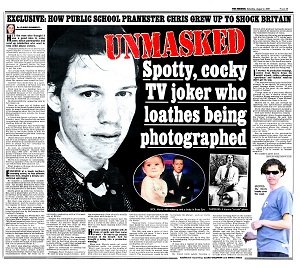
Morris, probably wisely, refused to discuss the program with the press. In response they went loudly insane at the whole thing. Both the Daily Mail and the Daily Star ran articles denouncing the show as sick and perverted. The hypocrisy Morris was targetting was on full display, however. The Star ran its article next to an article that showed the 15 year old singer Charlotte Church in a tight top and described her as a “big girl now”. The Mail meanwhile had in the same issue a paparazzi photograph of the 11 and 12 year old daughters of the Duchess of York at the beach, and described them as “bikini princesses”. Morris did have his defenders, but they were outnumbered by the bandwagon jumpers who sought to capitalize on the outrage.The MP Beverly Hughes, who went on to become Minister of State for Children, Young People and Families, described the show as “unspeakably sick”. On more questioning she admitted that she hadn’t actually watched it. Neither, one suspects, had most of the people who helped to give the show the official record for third most complaints ever received for a television show.
Of course nowadays, in the post-Operation Yewtree era, we know that some of the celebrities who Morris had fooled were themselves the ones preying on children. Rolf Harris, for example, or “Doctor” Neil Fox (who actually appeared in the Paedogeddon episode). The papers had preached of “stranger danger”, but the real danger came from within the establishment. Some may say Morris went after the wrong targets, but his real target wasn’t the paedophiles. It was the skewed media panic around the problem, panic which allowed the real threat to remain undetected.
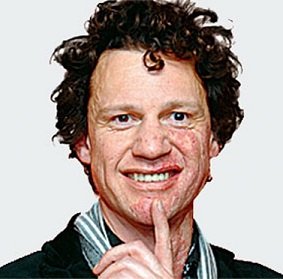
[1] Nowadays finally getting the recognition he deserves, after creating The Thick Of It and Veep.
[2] In the show (available on Youtube), Cook plays his role of Sir Arthur Streeb-Greebling, a stereotypical British upper class softly spoken utter bastard, who has led somewhat of a confusing life. He used the same role in interviews with Ludovic Kennedy his long-time comedy partner Dudley Moore.
[3] Amess, who was recently appointed by the government to chair a committee discussing the Psychoactive Substances bill, insisted that the DVD release of Brass Eye add a disclaimer that he “strongly disapproves of the use of recreational and addictive drugs”. It seems his greatest worry was that viewers might think he was in on the joke.
[4] “Nonce” being an old British slang word for paedophile. If you’re not sure why Morris chose this name, try reading it aloud.
[5] Morris covered the scarring from his teenage acne with make-up for his appearances on The Day Today and Brass Eye.
Banner via wikimedia.

